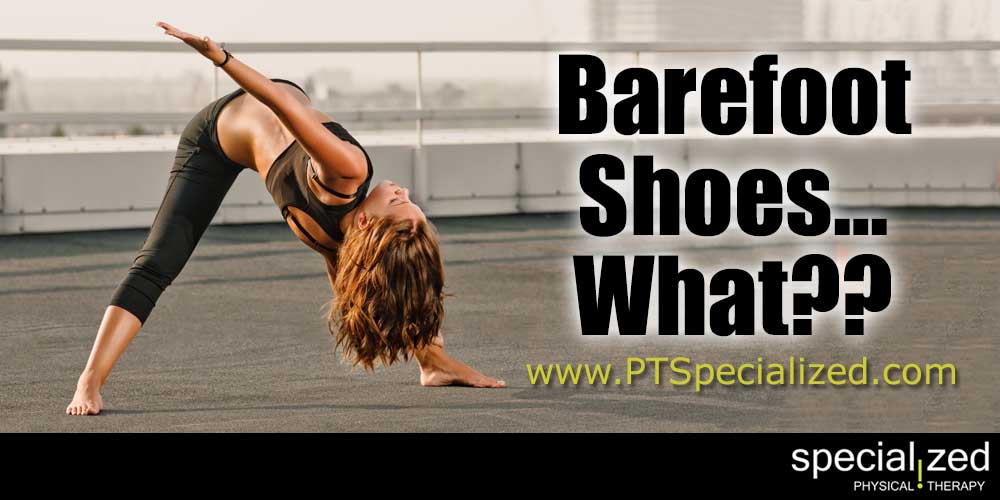
You may have noticed a recent trend on the local running trails, gym floors, or even just walking the aisles of the grocery store: “barefoot” shoes. What started out as a small movement has now become a minimalist revolution. The question, “What is your opinion on those barefoot shoes?”, is one we here often at Specialized.
The human foot is composed of 28 bones, 25 joints, and numerous muscles, tendons, and ligaments which allow for multidirectional movement and provide support to the foundation which we stand upon. Our feet and lower legs are uniquely designed to absorb and transmit forces from the ground, through our legs, and into our pelvis and spine
Plenty of researchers have linked improper footwear to increased incidence of knee pain, low back pain, plantar fasciitis, and other musculoskeletal injuries. Some have theorized that this is because while we search tirelessly for the most comfortable shoe, the problem is the shoe itself. “Minimalist” shoe proponents argue that if we confine our feet to shoes, we hinder our bodies’ natural ability to “do what it does best”. These people often cite the tribes of runners and hunters in third world countries who exist without the support of shoes and who do not appear to demonstrate the incidence of foot pain that our society has. This is the basis for their recommendation to ditch our modern shoes and go barefoot.
This theory certainly is intriguing and caused a few Physical Therapists at our clinic to do some further investigating and experimenting. You might even find a pair of “barefoot” shoes hiding in the backs of our closets. However, after some personal experiences and time spent looking into research, there were a few flaws (and injuries) that appeared. Here are a few notable pieces:
1. Our feet have done the majority of their developing within the confines of shoes. You’ve likely been wearing some type of foot protection since your little toddler feet hit the ground. This means that the intrinsic muscles and structures of your feet have adapted to this sheltered environment.
2. We walk on flat surfaces. Even if you were to try and “train” your feet to increase the strength of the supportive muscles by weaning out of shoes and walking around barefooted, because the ground that we live on is covered by vastly flat surfaces, those muscles aren’t being challenged appropriately.
3. Injured tissues do not behave the same as healthy tissues. If we were to ignore the two previous shortcomings altogether, there is yet another significant problem that exists. If you are experiencing pain that is related to weak foot muscles or poor foot mechanics, your tissue has already been injured. This means that it can no longer hold up against daily stresses which is why one might end up at Specialized in the first place. If you try to take a tissue that is already overstressed with daily life and demand even more of it by taking away the support of a shoe, you will likely make the problem much worse.
Certainly, there are some select individuals who are able to tolerate the transition to barefoot living, but when it comes down to it, there is a risk associated with “barefoot” shoes. This risk is also further elevated if you experience any pre-existing musculoskeletal pain.
Overall, we do not recommend that our patients make the move to “minimalist” shoes but instead address any limitations that might be contributing to their pain by utilizing the help of custom orthotics, exercises to train their supportive foot and ankle musculature, and neuromuscular training to improve their body’s ability to control their feet, legs and core.